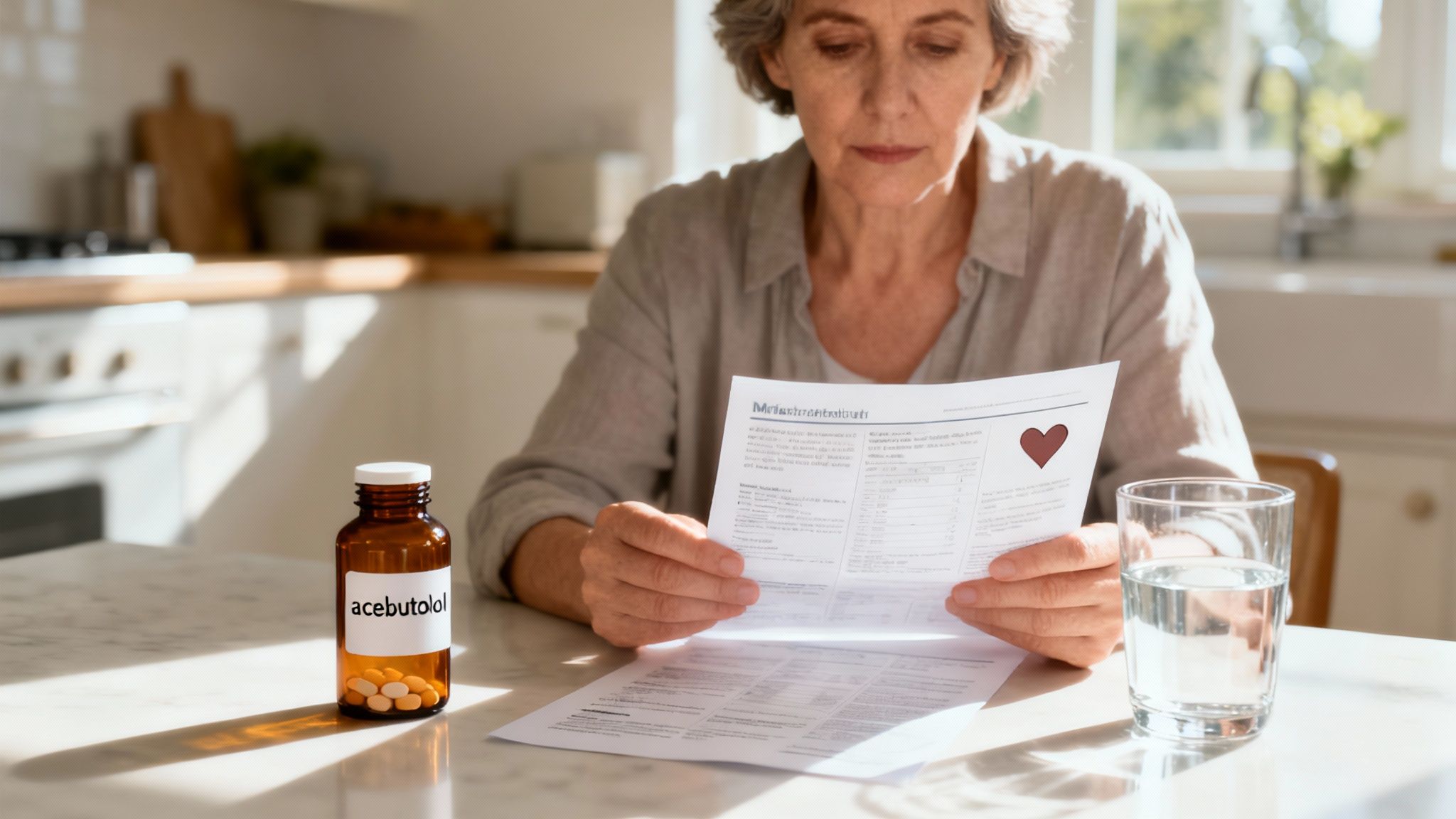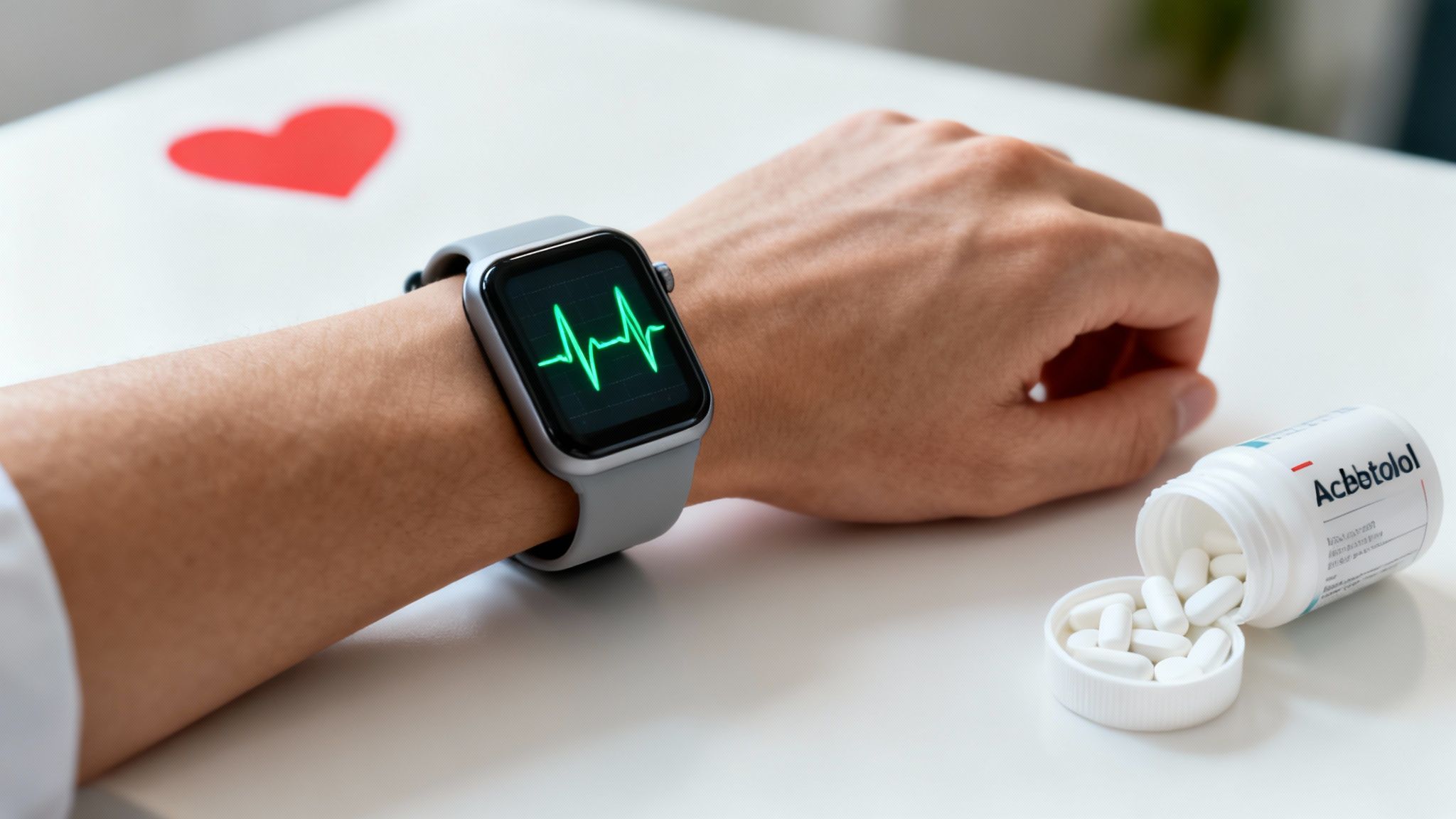Key Takeaways
Hello Heart Hero. Starting a new medication like acebutolol can bring up a lot of questions, and it’s completely normal to wonder what to expect. Common acebutolol side effects often include things like dizziness, feeling more tired than usual, headaches, and sometimes an upset stomach. The good news is, these usually fade as your body gets used to the medicine.
Knowing what might happen is the first step to confidently managing your heart health.
Your Guide to Understanding Acebutolol

You’re already taking a huge, positive step for your heart, and getting a handle on your treatment is a big part of that. We know that navigating healthcare can sometimes feel impersonal or just plain confusing. That’s exactly why we put this guide together, to be a clear, reassuring resource you can turn to.
We’ll walk through everything you need to know about acebutolol side effects, covering the common stuff and the rarer reactions. We'll also break down how it can affect your heart’s rhythm and show you how tools like at-home ECG monitors can help you keep an eye on things.
What to Expect in This Guide
Our main goal here is to arm you with knowledge. When you understand your treatment, you can have much better, more productive conversations with your doctor and feel more in control. Here’s what we’ll get into:
- Understanding the Basics: We’ll start with what acebutolol actually does and why it’s prescribed.
- Common Reactions: A look at the most frequent side effects and some practical tips for managing them.
- Heart Rhythm Changes: We'll dive into how acebutolol can impact your ECG and what to watch for at home.
- Serious but Rare Effects: Information on the important warning signs that mean it's time to call your doctor.
Acebutolol is part of a family of drugs called beta-blockers. Think of them as gatekeepers for your heart. They work by blocking stress hormones like adrenaline, which helps slow down your heart rate, lower your blood pressure, and keep your heart's rhythm steady. You can learn more about the long-term effects of beta-blockers in our detailed article.
Everyone's journey with a new medication is different. The most important things you can do are to pay close attention to how you feel and keep an open line of communication with your doctor.
This guide is here to support you every step of the way. By understanding what’s happening in your body, you can become a better partner in your own healthcare. Let’s get started.
Recognizing Common Side Effects

Starting any new medication, including acebutolol, means giving your body a little time to adjust. It's completely normal to notice a few changes during the first few days or weeks. Think of it as your body getting acquainted with a new helper that's working to protect your heart.
Many people report feeling more tired than usual right after they start. This makes perfect sense. Acebutolol is designed to slow your heart rate and lower your blood pressure, which can initially make you feel a bit sluggish. The good news is this fatigue often gets much better as your body gets used to the new normal.
Understanding the Most Frequent Symptoms
Feeling a bit dizzy, especially when you stand up too quickly, is another common experience. This happens because the medication lowers your blood pressure, and your body sometimes needs a moment to catch up when you change positions. Headaches and some mild digestive issues like nausea can also pop up as your system gets used to the drug.
These initial reactions are typically mild and manageable. Still, knowing what's happening and why can help you feel confident instead of worried. Here are a few of the most frequently mentioned side effects of acebutolol:
- Fatigue: A general sense of being tired or having less energy.
- Dizziness: Lightheadedness, especially when going from sitting to standing.
- Headaches: Mild to moderate headaches that often occur early on.
- Stomach Upset: Nausea, diarrhea, or constipation.
These aren't just anecdotes. Global data shows these common side effects are well-documented. For instance, fatigue, dizziness, and headaches are reported in 2% to 15% of people taking acebutolol. While less common, some may experience nightmares or sleep disturbances, which affect fewer than 5% of users. You can find more details in these acebutolol findings on patient.info.
What Your Heart Might Feel
One of acebutolol's main jobs is to slow your heart down. Medically, this intended effect is called bradycardia, or a slow heart rate. While this is often a good thing, sometimes the heart can slow down a bit too much, leading to symptoms like extreme fatigue or feeling faint.
Slowing down your heart rate is often the goal of treatment. But if your heart rate drops so low that it makes you feel unwell, it’s a sign that your dose might need a small adjustment.
This is exactly why monitoring your heart at home can be so empowering. If you’re ever curious about what a slow heart rate means for your health, you can learn more about what causes bradycardia in our guide. Most of these common side effects are simply signals that your body is adjusting. By staying hydrated, moving slowly, and keeping your doctor in the loop, you can navigate this initial phase with confidence.
How Your Dose Influences Side Effects
When it comes to medication, one size rarely fits all. Your body's reaction to acebutolol is unique, and the dose you take is a major factor in how you'll feel. It’s a bit like finding the right volume for music. Too low and you miss the benefits, too high and it can become overwhelming.
This is why your doctor will almost always start you on a low dose of acebutolol. It's not a shot in the dark; it's a deliberate and careful process called titration. By starting low and going slow, your doctor gives your body a chance to adjust to the medication, which helps minimize any initial side effects.
Over weeks or months, your doctor might gradually increase the dose. The goal is to find that perfect balance, or "sweet spot," where the medication is effectively protecting your heart with the fewest possible side effects. It’s a personalized journey to get the dosing just right for you.
The Dose and Symptom Connection
It's not just a theory. Research clearly shows a direct relationship between the dose of acebutolol and the likelihood of experiencing certain side effects. As the dose increases, so does the frequency of some reactions. This predictable pattern is one of the main tools your doctor uses to manage your treatment safely.
For instance, clinical trial data paints a clear picture. For central nervous system side effects like dizziness or headaches, the incidence jumped from 9% at a 400 mg daily dose to 17% at a 1200 mg dose. Similarly, respiratory symptoms went from 1% to 6% at the highest dose, and gastrointestinal issues climbed to 7%. You can explore more of these numbers in these acebutolol side effect statistics on medicinenet.com.
Knowing that side effects are often tied to your dose is incredibly useful. If you start to notice a new symptom right after a dose adjustment, that’s a clear signal to check in with your doctor.
This dose-response link is precisely why keeping an open line of communication with your healthcare provider is so critical. If you feel a new side effect or an old one gets worse after a dosage change, don’t just brush it off. Let your doctor know. They can often adjust the dose back down or explore other options to make sure you feel good while your heart stays protected. Your feedback is the key to finding that perfect balance.
Monitoring Your Heart's Rhythm at Home
Since acebutolol works by changing the way your heart beats, it’s completely expected to see some changes on your electrocardiogram (ECG). This is where having your own monitor at home becomes such a powerful tool, putting you in the driver’s seat of your own health journey. It lets you see for yourself how the medication is working, rather than just taking someone else’s word for it.
When you start taking acebutolol, one of the first things you might notice on an ECG is a slower heart rate, known as bradycardia. This is often a sign that the medication is doing exactly what it's supposed to. Another common finding is a slightly longer PR interval, which just means there's a tiny, controlled delay in the electrical signal as it travels through your heart. These are often the intended, positive effects of your treatment.

What to Look For on Your Home ECG
Using a modern device allows you to become an active partner in your care. You can track these subtle shifts over time, giving both you and your doctor a much clearer picture of how your body is responding. This is all about gathering your own data to have more informed, productive conversations.
You can learn more about the different kinds of devices available in our guide to the portable electrocardiogram monitor.
Here’s a quick rundown of what you might see:
- Slower Heart Rate: Your resting heart rate may drop. For many people, this is precisely the goal.
- Longer PR Interval: This reflects a slight slowing of the electrical signal between your heart's upper and lower chambers.
- Reduced PVCs or PACs: If you were prescribed acebutolol for extra beats, you should see fewer of them on your ECGs.
Higher doses may increase the chances of side effects, which is exactly why your doctor starts low and makes adjustments slowly.

ECG Changes That Need Attention
While most ECG changes are totally expected, there are a few red flags to watch for. These are rare, but it’s important to know what they look like. The goal isn’t to cause worry, but to empower you with knowledge so you know when to act.
One of the more important things to watch for is any sign of a significant heart block, where the electrical signal is getting delayed too much. For example, if your PR interval becomes very long or you see signs of what’s called a second-degree or third-degree AV block, it’s time to share that ECG with your doctor right away. Acebutolol can also sometimes affect the QTc interval, a measurement of how long it takes your heart to recharge between beats.
Monitoring your ECG at home transforms a complex medical process into something you can see and track. It gives you concrete data to bring to your doctor, ensuring your concerns are backed by real evidence.
Think of your at-home ECG as your personal health log. It turns abstract feelings and symptoms into clear data, helping you and your doctor work together to find that perfect balance for your heart.
Understanding Serious (But Rare) Acebutolol Side Effects
While most people do really well on acebutolol, it’s smart to know about the less common, more serious side effects. This isn’t about causing worry, but about giving you the knowledge to act fast if you ever need to. Think of it like knowing where the fire escape is in a building; you hope you never use it, but you feel safer just knowing it’s there.
We're talking about symptoms that need immediate medical attention. Your health is the top priority, and recognizing these signals is a huge part of taking care of yourself.
When to Seek Immediate Medical Help
Some symptoms can be a sign that acebutolol is having a more serious effect on your body. It's really important to call your doctor or get emergency help if you experience any of these red flags:
- New or Worsening Chest Pain: Any chest discomfort that feels new or different from your norm is a reason to get checked out right away.
- Significant Shortness of Breath: If you suddenly have a hard time catching your breath, especially while you're resting, it needs prompt attention.
- Swelling in Legs or Ankles: This can be a sign of heart failure, meaning your heart isn't pumping as efficiently as it should be.
- Severe Dizziness or Fainting: While a little lightheadedness can be common, feeling like you’re actually going to pass out is a much bigger deal.
These symptoms are your body sending up a flare. Listening and acting on them is one of the most proactive things you can do for your heart.
Very Rare Immune and Organ Reactions
In extremely rare situations, acebutolol can confuse the body's immune system, triggering a condition that looks a lot like lupus. This might show up as ongoing joint pain, a fever that just won't break, or a distinctive butterfly-shaped rash across your face.
The most reassuring thing to know is that these very rare reactions are typically reversible. Once the medication is stopped under a doctor's care, the symptoms usually resolve.
Post-marketing data from FDA documents shows that significant reactions like severe low blood pressure, bradycardia, or heart failure happen in 2% or fewer of patients. This same research confirms the lupus-like syndrome is an extremely rare side effect. It also notes rare liver issues have been reported, which also cleared up after stopping the medication. You can read more about these acebutolol side effect findings.
On top of that, some beta-blockers, including acebutolol, can sometimes affect the QT interval on an ECG. While it’s not common, a significant change could increase risk, so it's something to be aware of. If you're curious, you might find our guide on drugs that cause QT prolongation helpful for more context. Your awareness of these rare but serious acebutolol side effects is a powerful tool in your health toolkit.
Your Questions About Acebutolol Answered
Starting a new medication always comes with a few questions. It's completely normal to feel a bit uncertain, and getting clear, straightforward answers is a huge part of feeling confident about your health. Here are some of the most common questions people ask when they begin taking acebutolol.
Can I Stop Taking Acebutolol if I Feel Better?
This is a really important one. The answer is a hard no, you should never stop taking acebutolol suddenly. Just quitting can cause a rebound effect where your blood pressure or heart rate spikes dangerously high. This could lead to serious problems, like chest pain or even a heart attack.
If you and your doctor agree it's time to come off the medication, they'll set you up with a gradual "tapering" plan. This means you'll slowly reduce your dose over a period of time, giving your body a chance to adjust safely and comfortably.
What Should I Do if I Miss a Dose?
Forgetting a dose happens to all of us. If you miss one, the usual advice is to take it as soon as you remember. But if it’s already getting close to the time for your next scheduled dose, it’s better to just skip the missed one entirely and get back on your normal schedule.
Whatever you do, do not take a double dose to catch up. Taking extra medication at once can seriously increase your risk of side effects, like your heart rate dropping too low or feeling extremely dizzy.
Should I Avoid Any Specific Foods or Drinks?
The good news is there aren't any specific foods you must avoid while taking acebutolol. It is, however, smart to be mindful of alcohol. Alcohol can amplify the blood-pressure-lowering effects of acebutolol, which could leave you feeling more dizzy or lightheaded than you normally would.
It’s always a good idea to chat with your doctor about your diet and any supplements you're taking. This helps make sure your entire lifestyle is working together with your treatment plan.
How Long Do the Initial Side Effects Last?
Many of the milder, more common side effects of acebutolol, like fatigue or dizziness, often get much better or disappear completely within the first few weeks. Think of it as your body's adjustment period as it gets used to the medication.
These initial symptoms are the most likely to fade as your body adapts.
However, if you find that any side effects are sticking around, getting worse, or just really bothering you, it's important to speak up. A simple conversation with your doctor can make all the difference. They might suggest a small dose adjustment or even try a different medication that's a better fit for your body. Your comfort is just as important as the medication's benefits.
With Qaly, you can get your wearable ECGs reviewed by certified experts in minutes, any time of day.










.png)
.png)